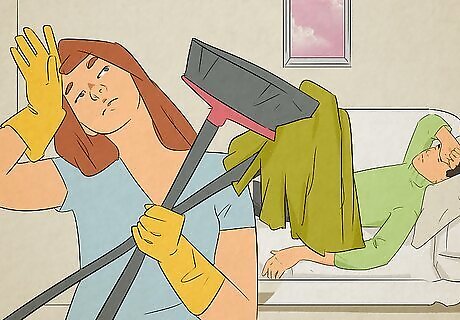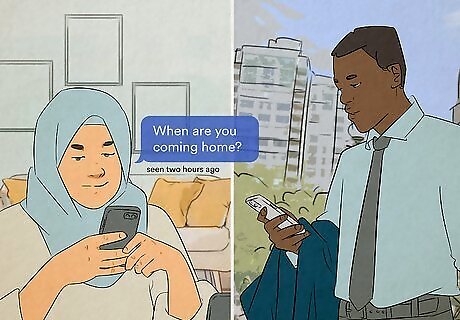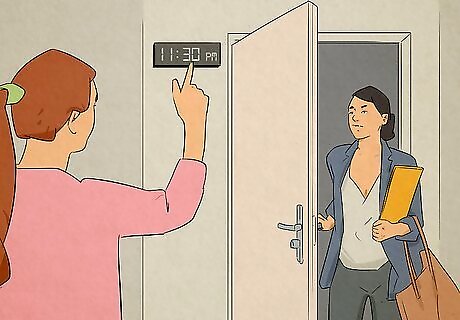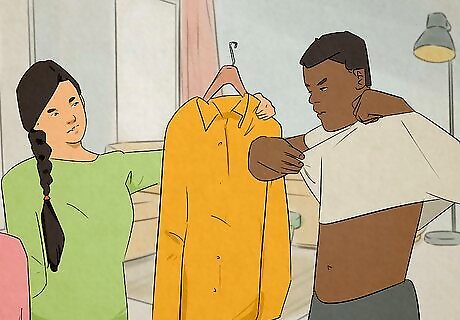
views
- There might be double standards in your relationship if your partner has rules for who you can hang out with, but they don’t follow those rules themselves.
- Or, your partner may expect you to take on more of the household chores, even though they don’t do their fair share.
- Your partner might also flirt with other people, even though they’d be super upset if you did the same thing.
- Avoid double standards by pointing them out to your partner whenever they happen. Work together to set boundaries for the relationship that seem fair for both of you.
Common Double Standards in Relationships

Who you can and can’t hang out with Maybe your partner has a rule that you can’t hang out with the opposite sex alone, but they don’t hold themselves to the same standards. Or, maybe there’s a rule that you can’t hang out with your ex, but your partner can hang out with their exes.

Household chores Splitting up household chores is a point of contention for many couples. Double standards come into play when your partner expects you to take care of more chores and not split things evenly. It’s fine if one partner takes on more chores than the other, but you two need to discuss that first. Making a chore chart is a good way to keep track of who does what on a daily basis.

Answering texts and calls in a timely manner Maybe your partner freaks out when you don’t answer their texts within 5 minutes, but you can’t get ahold of them for hours at a time. They’re expecting you to reply quickly when they can’t give you that same courtesy.

Who pays for dates In heterosexual relationships, there can often be an expectation that the man should pay for almost everything. However, this is an outdated stereotype that can eventually cause resentment within the relationship. Nowadays, it’s common for whoever asked the other person out on the date to pay. In a long-term relationship or marriage, most couples end up splitting things fairly evenly.

Flirting with other people Some couples don’t mind it if their partner flirts with other people, while other couples view it as cheating. The important thing is that you and your partner are on the same page.

Making fun of each other Little jokes at each other’s expense are fine, but there comes a time when jokes can cross the line. When you poke fun at your partner, do they get super offended? Now, think about what happens when they poke fun at you: if you get upset, do they claim that you’re overreacting? Of course, there are some things you just shouldn’t joke about, like your partner’s insecurities.

Talking about the relationship with friends It’s normal to chat with your friends about your relationship, especially if you’re asking for advice. A double standard comes into play when your partner can talk with their own friends about the relationship but gets upset at you for talking about it with your own friends.

Saying no to sex Both partners can say no to sex at any time for any reason. You might notice that when you say no, your partner gets upset and moody, but when your partner says no, you accept their answer without question. Acting upset and moody after being rejected can be a form of manipulation. Even if your partner isn’t doing it on purpose, they are making you feel bad for saying no to sex, which isn’t okay. Upset and moody can be stages of anger, and sometimes those things are actually appropriate. You need to figure out if their reaction is appropriate to the situation to evaluate if they're trying to manipulate you. Sometimes, this is done on purpose to make a statement and make you regret your decision.

Staying out late In many partnerships, it’s expected that if you’re staying out late, you’re going to tell your partner when you’re coming home. Does your partner expect this of you, but then they stay out late without answering your calls or texts?

Childcare When you’re both tired after a long day of work, who’s the one who takes care of the kids? If you find that you’re always picking up the slack while your partner relaxes on the couch, that can lead to a lot of resentment down the line. Even if one of you is a stay-at-home-parent and the other one works, that doesn’t mean the stay-at-home-parent should always take care of the kids.

Talking about each other’s friends and family For a lot of people, their partner’s relationship with their friends and family is very important. You might find that your partner talks badly about your friends and family but gets upset when you criticize their friends or family.

Privacy Maybe your partner demands that they have your passwords to everything, but when you ask for theirs, they start talking about their own privacy. Or, your partner might ask you about your finances but refuse to share anything about their own income.

Alone time Even when you’re in a committed relationship, it’s important to maintain your independence. Maybe you ask for more alone time and your partner gets upset, but they take all the alone time they need.

Perceiving jealousy Sometimes, the way we perceive jealousy is different based on who we are. Your partner might see their jealousy as endearing and charming, but you might view their jealousy as possessive. Similarly, if you get jealous, your partner might view it as annoying or controlling, while they think their own jealousy is justified.

Giving the silent treatment Sometimes, when someone doesn’t know how to express themselves, they will shut down and give their partner the silent treatment. You might notice that your partner has no problem giving you the silent treatment, but if you do the same, they get really upset.

Making decisions for each other Maybe your partner commits to plans for the two of you all the time, but when you do it, they get angry. Or, maybe your partner makes a lot of the big decisions in your relationship (like where you’re going to live, how you’re going to split bills), but if you did that, they’d be upset.

Treatment of each other’s families Whether you’re already married or you’re planning on getting married, your in-laws are going to be part of your life. Sometimes, a double standard can arise where one partner’s family is treated well and visited often, while the other partner’s family isn’t.

Accepting each other’s beliefs You and your partner may disagree on some things, but that doesn’t mean you can’t have a healthy relationship. You might notice that you always try to keep an open mind and hear your partner out, but your partner doesn’t do the same for you.

Being a good listener With so many distractions in our lives, it’s easy to get side-tracked when your partner is talking to you. Your partner might demand 100% of your attention when they’re talking, but only gives you about half of theirs when you talk.

Getting over issues quickly When you and your partner get into an argument, it might take you a little while to get back to normal. Your partner might demand that you “get over it,” but then take all the time they need when they’re upset.

Managing finances Managing money can definitely be a tough balancing act when both you and your partner are working out of the same bank account. Still, money can become a double standard when your partner gives themselves the freedom to buy whatever they'd like while you're expected to be frugal.

Personal appearances Your partner might make unnecessary comments about how you look, or try to get you to dress a certain way. However, they find it offensive and even unacceptable when you make equivalent comments about how they look or dress.
How to Avoid Double Standards

Call out double standards when they happen. It’s possible that the double standards in your relationship aren’t happening on purpose. When you notice that something is unfair, let your partner know. They might not even realize that they’re expecting things of you that they don’t do themselves. “You know how you ask me to always text you when I’m out late? Well, you didn’t respond to my texts at all last night. It feels like a double standard.” “We always visit your family, but we only see my parents once a year. Why is that?” “You have all my passwords, but I don’t know any of yours. It doesn’t feel fair.”

Ask your partner to compromise with you. The best way to rectify double standards in your relationship is to meet somewhere in the middle. Talk about your needs, then let your partner express their needs. Then, come up with a compromise that works for the both of you. For instance, if your partner wants you to pay for all of your dates but you want to split things evenly, say, “Let’s try to split things evenly most of the time. I’ll still treat you every now and then, but it would make me feel a lot better if we split costs fairly.” Or, if your partner gets upset when you take your alone time but they have alone time a lot, say, “What if on Thursdays, we spend the evening apart? That way, we both come back feeling refreshed.” Remember that relationships don't have to be completely split down the middle in every single situation. If it's not something where both people kind of agree to it, then meeting in the middle does not always make sense. Use common sense when bringing up these kinds of situations and try to have honest and thoughtful conversations with your partner.

Set your boundaries and don’t let your partner cross them. Establishing boundaries lets your partner know what’s okay and what isn’t. Tell your partner that upholding double standards is unacceptable, and let them know that you’ll have to rethink the relationship if they cross your boundaries again. “You can’t expect me to answer the phone while I'm at work. I have to keep my phone in my locker, so please stop blowing me up with texts during my shift. I'll check in with you on my breaks.” “It's not fair for you to expect me to do all the housework. I need you to pitch in if we're going to live together.”

See a couple’s counselor if you and your partner are having issues. Sometimes, double standards in the relationship can mean that there are more serious underlying issues. If that’s the case, ask your partner to go with you to a couple’s counselor. A professional will give you unbiased advice and help you work through your issues together.

Visit a professional to talk about your own double standards if you need to. Maybe you’ve realized that you’re upholding some double standards in your relationship. If that’s the case, visit a mental health professional to talk about where these double standards are coming from. They can help you address any unrealistic expectations you have for your relationship and rectify them to avoid conflict.
What are double standards?

Double standards are rules that only apply to one person and not the other. In relationships, this usually happens when one partner has expectations for the other person that they don’t follow themselves. For instance, maybe your partner hates it when you don’t text them back, but they never answer your texts in a reasonable amount of time. Or, maybe your partner got mad at you when you stayed out all night, but they stay out all night without telling you where they are often.
















Comments
0 comment